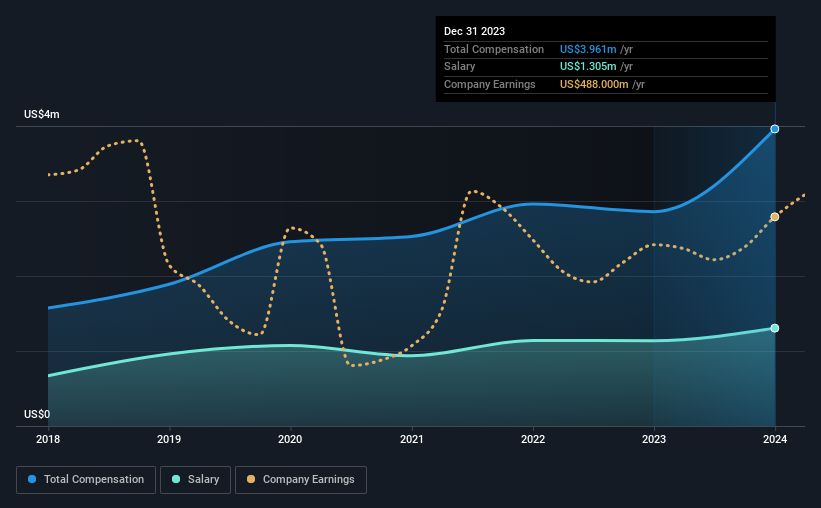Key Insights
-
Autoliv’s Annual General Meeting to take place on 10th of May
-
CEO Mikael Bratt’s total compensation includes salary of US$1.30m
-
The total compensation is 77% less than the average for the industry
-
Autoliv’s EPS grew by 29% over the past three years while total shareholder return over the past three years was 27%
The decent performance at Autoliv, Inc. (NYSE:ALV) recently will please most shareholders as they go into the AGM coming up on 10th of May. The focus will probably be on the future strategic initiatives that the board and management will put in place to improve the business rather than executive remuneration when they cast their votes on company resolutions. Here is our take on why we think CEO compensation is fair and may even warrant a raise.
See our latest analysis for Autoliv
How Does Total Compensation For Mikael Bratt Compare With Other Companies In The Industry?
According to our data, Autoliv, Inc. has a market capitalization of US$9.9b, and paid its CEO total annual compensation worth US$4.0m over the year to December 2023. We note that’s an increase of 39% above last year. While this analysis focuses on total compensation, it’s worth acknowledging that the salary portion is lower, valued at US$1.3m.
On comparing similar companies in the American Auto Components industry with market capitalizations above US$8.0b, we found that the median total CEO compensation was US$17m. That is to say, Mikael Bratt is paid under the industry median. Furthermore, Mikael Bratt directly owns US$2.1m worth of shares in the company.
|
Component |
2023 |
2022 |
Proportion (2023) |
|
Salary |
US$1.3m |
US$1.1m |
33% |
|
Other |
US$2.7m |
US$1.7m |
67% |
|
Total Compensation |
US$4.0m |
US$2.9m |
100% |
On an industry level, roughly 13% of total compensation represents salary and 87% is other remuneration. It’s interesting to note that Autoliv pays out a greater portion of remuneration through salary, compared to the industry. It’s important to note that a slant towards non-salary compensation suggests that total pay is tied to the company’s performance.
A Look at Autoliv, Inc.’s Growth Numbers
Autoliv, Inc.’s earnings per share (EPS) grew 29% per year over the last three years. In the last year, its revenue is up 15%.
Shareholders would be glad to know that the company has improved itself over the last few years. It’s also good to see decent revenue growth in the last year, suggesting the business is healthy and growing. Historical performance can sometimes be a good indicator on what’s coming up next but if you want to peer into the company’s future you might be interested in this free visualization of analyst forecasts.
Has Autoliv, Inc. Been A Good Investment?
With a total shareholder return of 27% over three years, Autoliv, Inc. shareholders would, in general, be reasonably content. But they probably wouldn’t be so happy as to think the CEO should be paid more than is normal, for companies around this size.
To Conclude…
The company’s overall performance, while not bad, could be better. If it manages to keep up the current streak, CEO remuneration could well be one of shareholders’ least concerns. Instead, investors might be more interested in discussions that would help manage their longer-term growth expectations such as company business strategies and future growth potential.
CEO compensation can have a massive impact on performance, but it’s just one element. That’s why we did some digging and identified 3 warning signs for Autoliv that you should be aware of before investing.
Arguably, business quality is much more important than CEO compensation levels. So check out this free list of interesting companies that have HIGH return on equity and low debt.
Have feedback on this article? Concerned about the content? Get in touch with us directly. Alternatively, email editorial-team (at) simplywallst.com.
This article by Simply Wall St is general in nature. We provide commentary based on historical data and analyst forecasts only using an unbiased methodology and our articles are not intended to be financial advice. It does not constitute a recommendation to buy or sell any stock, and does not take account of your objectives, or your financial situation. We aim to bring you long-term focused analysis driven by fundamental data. Note that our analysis may not factor in the latest price-sensitive company announcements or qualitative material. Simply Wall St has no position in any stocks mentioned.
